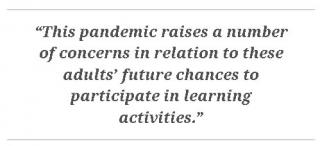Low-skilled and low-paid adults are providing essential services and known as key workers during the current pandemic. Will they have better chances for personal and career-related development in the future?, asks the University of Glasgow's Professor Ellen Boeren from the UK.
Source: Elm Magazine | Participation in adult education and the pandemic: Who is missing out?
Throughout my career, I have developed a strong interest in furthering the understanding of why adults do or do not participate in adult learning activities.
Generally speaking, across Europe and within the UK, participation statistics have demonstrated stark variation in the engagement of adults from different socio-economic and socio-demographic groups. Low-educated adults, those in routine occupations and older adults tend to participate less.
The current COVID-19 pandemic raises a number of concerns in relation to these adults’ future chances to participate in learning activities.
IT IS THESE ISSUES THAT SHOULD now be discussed and act as a vehicle to lower barriers for these groups for good. With the majority of adult education across Europe and in the UK now being work-related in nature, it is especially low-skilled and low-paid adults who are missing out on learning opportunities.
Ironically, these same groups of people are now providing essential services and are known in the UK as ‘key workers’.
One of the main concerns in the UK has been the lack of ‘Personal Protection Equipment’ and the increased risks of these key workers to become infected with COVID-19. It will be interesting to see how the UK government will deal with valuing the contribution these people have made and whether this will have a positive knock-on effect on their chances for personal and career-related development.
However, with the economy on course to shrink, the danger is very real that workers who are traditionally not targeted for adult education might lose out again. Some of them might become unemployed. Others might be able to stay in businesses that might not have sufficient capital to invest in education and training of their employees.
Governments, both in Westminster and in the devolved countries of the UK, for example Scotland, will have to engage in debates on how to survive this crisis and what types of skills will be needed to succeed.
Participation in adult education is not only the result of an individual’s motivation to learn something new. It always happens in interaction with education and training institutions who offer learning activities and the supporting role of the government.
Public Employment Services might have to implement post-COVID-19 training programmes to tackle rising levels of unemployment and work with local business, adult education centres, colleges and universities to realise this strategy.
While the current pandemic has led to a dramatic number of deaths – the UK death toll passed 10,000 on Easter Sunday – it needs to be seen as a wake-up call to finally end the huge social inequalities that exist in British society. Not only low educated workers are a forgotten group of potential adult learners, so are many older adults.
In the UK, several universities and organisations have rolled out distance learning programmes. With a stark digital divide between younger and older generations, it is doubtful these initiatives will reach many older adults who might not have access to an internet connection.
Making sure that all adults have adequate levels of digital literacy skills might be another way forward to helping everyone cope with potential future crisis situations. Again, adult education will have a crucial role to play.
Overall, adult education is not only a valuable tool to address the needs of the economy but can also serve to help people interact with each other, both in good and bad days.
ELM Magazine (European Lifelong Learning Magazine; ISSN 2489-5865) is a free online magazine on lifelong learning and adult education. It is the only journalistic medium of adult education with a European scope and with a continent-wide correspondent network. Elm Magazine headquarters is located in Helsinki, and the main publisher is the Finnish Lifelong Learning Foundation, KVS.
Sport media | UK Trainer News & Releases
- Log in to post comments













Latest Comments